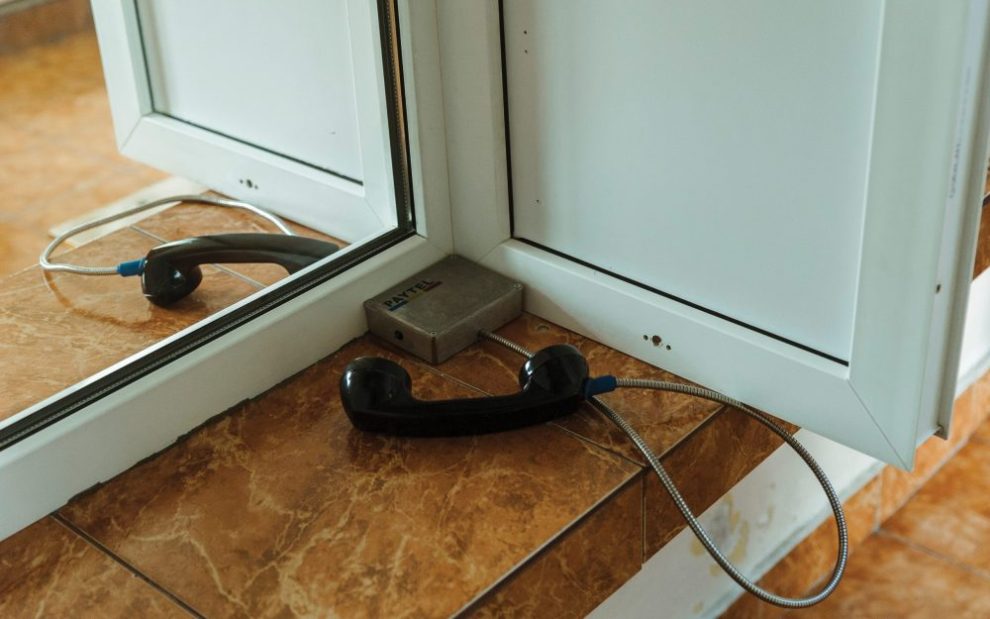“When you find yourself in a situation like mine, you tend to forget that you have value, that you’re worth something. . . . So once again thank you for that reassurance. . . . Your writing made someone feel human again.”
Holding a letter from prison in my hands—be it scrawled or elegantly scripted on notebook paper, torn edges of magazine articles, or the backside of a greeting card—I can almost feel the full weight of the cross. I find that to walk alongside someone in prison is to walk with Jesus on the road toward Golgotha, to accompany Christ crucified.
When I read words like those written above by Jonathan, I am awed by the restorative power of human connection. That power brings new meaning to Jesus’ proclamation of freedom to captives, his directive to visit the imprisoned, and, ultimately, his promise of new life for us all.
The human connection first drew me to restorative justice and prison ministry. I was a newlywed when I began working in the juvenile detention center in Chicago. Raised on a farm in Nebraska, I was a white girl whose upbringing was far removed from the experiences of the teenage boys I visited. At first, I felt intimidated and unsure how to relate to them.
One of the boys I visited was 17-year-old Domingo. He had an energy about him. He was charming, quick to smile, and hopeful about his case. He faced a serious charge, but he was convinced the evidence was in his favor.
I became pregnant with my first child during those months that I visited Domingo. When my pregnancy started to show, he noticed, and his eyes lit up. His girlfriend was also expecting, and he was excited to be a dad.
He would ask about my morning sickness and what it felt like when the baby kicked. When his son was born weeks later, he showed me pictures, beaming. The birth had gone well; everyone was healthy. He shared his confidence that my own birthing experience would be equally joy-filled.
The weeks passed, and Domingo kept waiting for his day in court. He turned 18 and was eventually transferred to the adult jail, where I lost contact with him. Months later, I learned he had been convicted of first-degree murder and sentenced to 40 years in prison.
I could not help but weep. For Domingo and for his son. For the numerous ways his family and community would miss him, his personality, his gifts. For the victim in this case—a man who lost his life—and for his family, friends, and community. For the lack of opportunity for anyone to tell the truth, apologize, and take responsibility for the harm they caused. For the healing that may never come. For a society that continues to dispose of people due to their actions, their race, their mental condition, their poverty. For my own complicity in this system, my own sinfulness, and for the ways I, too, have harmed others. The seemingly endless pain ripples in different ways through the lives of people in prison.
Meanwhile, Jesus’ call to draw near to the imprisoned resonates as loudly today as it did for Jesus’ first followers. “I was in prison, and you visited me,” Jesus tells us (Matt. 25:36).
There was no formal prison system in biblical times; when scripture and other historical writings refer to prison, we might more accurately understand the word to mean “in custody” or “guarded,” awaiting trial where punishment would be decreed. “Prisoners” were removed from their communities, deprived of material provisions, and often subjected to violence. To be incarcerated—whether in a cave, in an underground room, in shackles, or by house arrest—was a shameful thing. Family and community often abandoned prisoners. Nobody cared for them.
The earliest Christians boldly embraced Jesus’ teaching and acted against societal norms. They risked their lives and traveled great distances to offer food and companionship to members of their communities who were “in prison”—and they extended this ministry to nonbelievers, too. St. Paul affirmed these actions, instructing the early church to remember prisoners as if they themselves were imprisoned with them (Heb. 13:3).
Today we name this action one of the corporal works of mercy, a short list of obligatory responses to the suffering of others. Yet, as the early Christ-followers demonstrated, visiting the imprisoned is so much more than a box to check off on a Catholic to-do list; it’s not a one-off act of kindness. Instead, it is a way of being in community that counteracts society’s attempts to strip certain members of their right to belong. Visiting people who have been incarcerated is a way to insist that every person, without exception, has a home within the body of Christ.
\Being in relationship with individuals in prison—including and especially those who have committed grievous acts—expresses the heart of what it means to practice faith in Jesus. As St. Paul wrote in a letter he sent during his own imprisonment, “God, who is rich in mercy, because of the great love he had for us, even when we were dead in our transgressions, brought us to life with Christ” (Eph. 2:4).
Today, those in the tombs of society—21st-century prisons—urgently need resurrection. Theologian and prison chaplain Kathryn Getek Soltis encourages us to recognize imprisonment as a modern-day manifestation of Jesus’ crucifixion. She urges us to press on toward both personal and communal resurrection:
Our faith story does not culminate in Good Friday. . . . Suffering as a consequence of our sin does not make us whole again. Our suffering doesn’t reconcile us or restore our relationships. For that we need Easter Sunday. Sunday is when we see that life is more powerful than death.
Prison ministry has brought me new life as well. It has helped me to see more clearly my own failings—moments when I harm other people out of anger or pride, when I choose my own comfort over others’ needs, or when I participate in the systemic sins of racism, oppression, and exclusion. But I always come back to center, to God’s presence in me, to God’s grace and mercy showered on me. And then God calls me to shower divine grace and mercy on others.
In The Book of Forgiving (HarperOne), Archbishop Desmond Tutu and his daughter, Reverend Mpho Tutu van Furth, describe this realization as an encounter with fragile humanity:
We are able to recognize that we are all fragile, vulnerable, flawed human beings capable of thoughtlessness and cruelty. We also recognize that no one is born evil and that we are all more than the worst thing we have done in our lives. A human life is a great mixture of goodness, beauty, cruelty, heartbreak, indifference, love, and so much more.
When we visit the imprisoned, share in their pain, and see their goodness, the possibilities for new life become endless. We inspire hope that endures even in the worst circumstances. As we refuse to be complicit in systems of violence, we build new pathways toward healing and safety that won’t sacrifice human dignity. We work toward a world that looks more like the realm of God that Jesus proclaimed.
And this—building a world marked by healing for the brokenhearted, liberty for captives, and freedom for prisoners—is a transformative work of resurrection.
This article also appears in the June 2024 issue of U.S. Catholic (Vol. 89, No. 6, pages 45-46). Click here to subscribe to the magazine.
Image: Shutterstock/Sorin Vidis














Add comment